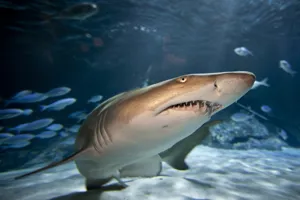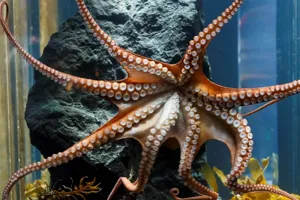
At SEA LIFE Kelly Tarlton's Aquarium, we offer engaging, hands-on experiences students need to ignite their natural curiosity, helping them develop essential skills in a fun and exciting way to set them up for a lifetime of successful learning. We currently offer two different types of visits:
Self-directed visit
Your group will able to explore our aquarium at your own pace through a self-directed visit to see the highlights of the aquarium, getting hands-on in our rockpools and viewing sharks, stingrays, turtles, and penguins.
Classroom Session
The 45-minute classroom session involves an educational presentation from one of our dedicated marine educators in our school room, where students are encouraged to explore and imagine. The classroom session will focus on your topic of choice, all of which include a show-and-tell with authentic animal artefacts.
Your group will then embark on a self-directed visit around the highlights of the aquarium to view sharks, stingrays, turtles, penguins and much more! Topic specific worksheets are available for download to help provide the highest level of educational value to your students during their visit.
Please note that, due to high demands, these sessions may be limited.
Program Pricing
| 2025 Prices | |
| Self-Directed Visits | $15.00 |
| Classroom Session | $18.00 |
| FREE teacher ratio for Years 1 - 8 | 1:6 - 1 free adult for every 6 students |
| Additional teacher/adult supervisor | $32.00 |

Habitats and Adaptations
Students will explore different habitats and meet the animals that live there. Use of authentic marine artefacts will engage students every step of the way. Education session content will vary between year levels, designed to complement the New Zealand curriculum as well as build on each other from year to year. By completing this session, students will:
- Learn what a habitat is and be able to identify a range of different marine habitats.
- Understand the requirements that a habitat must meet for creatures to survive there.
- Learn what an adaptation is, understand the different types of adaptations and how they occur.
- Be able to identify adaptations certain animals have developed.
- Learn that ecosystems are made up of interdependent animals living in the same environment
- Be able to identify different marine creatures
Book Now

Food Chains & Ecosystems
Students will dive in to investigate who eats who in the oceans guided by one of our expert marine educators. They will be led through several different ecosystems, exploring the unique food chains and food webs that exist there. Education session content will vary between year levels. By completing this session students will:
- Understand what ‘food chains' and 'food webs' are, and the difference between them.
- Learn that animals perform different roles in their specific ecosystems (i.e. producer, consumer).
- Understand that animals and plants need to remain balanced in their ecosystem and that imbalances can cause problems for all connected organisms (trophic cascades).
- Be able to identify marine creatures that make up certain food chains.
- Be able to identify different marine habitats.
Book Now

Conservation
Students will uncover the threats to our environment and discover what we can all do to help. One of our expert marine educators will take your class through issues ranging from overfishing, bycatch, pollution and habitat loss – all while inspiring them with solutions and actions that we can all take part in. Education session content will vary between year levels. By completing this session students will:
- Become familiar with a range of different marine creatures and environments.
- Learn about a variety of threats affecting different species.
- Understand that human activity can have a big impact on marine creatures, and what these impacts are.
- Find out what steps they can take to help protect vulnerable marine species and their habitats.
- Find out about the work SEA LIFE is doing to protect the ocean and its creatures for future generations.
Book Now

Antarctica
Discover Earths harshest habitat - Antarctica! Students will hear about the early explorers, why they went there and what they achieved. We won’t forget about the animals either – your class will learn about the special adaptations to the cold that many Antarctic animals have. Education session content will vary between year levels. By completing this session students will:
- Become familiar with key characters in early Antarctic exploration.
- Learn who Robert Falcon Scott was, and what he contributed to Antarctic exploration as well as modern climate change research.
- Recognise the Antarctic habitat and learn about the environmental conditions present in Antarctica.
- Learn about some of the ways that animals have adapted to life in Antarctica and be able to recognise these features on penguins.
Book Now

Weird and Wonderful
Welcome to "Weird and Wonderful", an exploration of the extraordinary adaptations found in the marine environment. While we often hear about basic adaptations like the protective shells of sea turtles or the sharp teeth of sharks, nature has crafted an array of bizarre and fascinating strategies that go far beyond these common traits. In this lesson, we will delve into some of the truly unusual and ingenious ways animals have evolved to survive and thrive in their environment.
From having different types of blood, having more than one jaw or even glowing in the dark, these adaptations are just some examples of the incredible diversity of life on Earth. We'll examine how these unique traits help animals find food, escape predators, and cope of the challenges of their habitats.
*Suitable more older students (year 3+)
Book Now